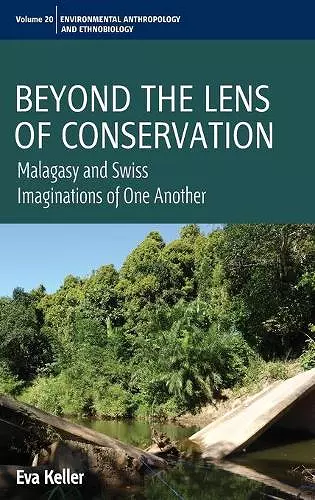Beyond the Lens of Conservation
Malagasy and Swiss Imaginations of One Another
Format:Hardback
Publisher:Berghahn Books
Published:1st Feb '15
Currently unavailable, and unfortunately no date known when it will be back

The global agenda of Nature conservation has led to the creation of the Masoala National Park in Madagascar and to an exhibit in its support at a Swiss zoo, the centerpiece of which is a mini-rainforest replica. Does such a cooperation also trigger a connection between ordinary people in these two far-flung places? The study investigates how the Malagasy farmers living at the edge of the park perceive the conservation enterprise and what people in Switzerland see when looking towards Madagascar through the lens of the zoo exhibit. It crystallizes that the stories told in either place have almost nothing in common: one focuses on power and history, the other on morality and progress. Thus, instead of building a bridge, Nature conservation widens the gap between people in the North and the South.
“This book will make a great addition to undergraduate courses on Anthropology of the Environment and/or Development or Political Ecology. Keller’s highly readable style, in turn, will satisfy both those new to the subject and scholars already familiar with the topics of conservation practice in Madagascar. It could even become an important resource for those conservation experts who are trying – and (as the study shows) failing – to establish connections between distant places and people.” • Journal of the Royal Anthropological Institute
“In the ongoing scholarly conversation about people and the protection of nature, Eva Keller’s ethnography… provides a fresh and unique voice. It is a thought-provoking reflection of how ordinary people at two ends of a conservation partnership see – or more often, see past – each other… Keller’s ethnography is captivating and original, and her arguments well supported and vividly illustrated by poignant examples.”• Anthropos
“…a must-read for any conservationist concerned by human rights, in addition to social scientists interested in conservation issues.”• Environment and History
“…the book [is] very engaging and enlightening… It is a worthwhile addition to the literature on inequality and conservation, and provides many interesting and engaging ideas that can be built upon in further research.”• Anthropological Forum
“The book’s strongest part is indeed the fine, solid and thick ethnography of both groups of people. In the end, the book touches on topics that are definitely interesting for an audience wider than just anthropologists… Anyone interested in processes of environmental conservation and topics concerning Madagascar should explore Keller’s ethnography describing one world where people successfully pass each other by.”• Social Anthropology
“ [Keller’s] ability to keep her discussions grounded in tangible examples makes the monograph ideal for undergraduate and graduate readers interested in conservation, environmental anthropology, and political ecology. By bringing together Swiss and Malagasy voices, the book also provides students with an entry point into considering their own potential roles in producing and circulating global environmental imaginations.”• Current Anthropology
“Beyond the Lens of Conservation is an original and important contribution not only to the literature on parks and development generally but on the frictions and contact zones of the modern world, where people, despite good intentions, seem to continue to engage with their imaginaries and schemas rather than the realities of other people whose lives are affected by those well-intentioned policies. Scholars and general readers alike should find the book accessible and thought-altering.”• Anthropology Review Database
“What sets [the book] apart…is the study’s greatest hook: its approach to the obvious connection between ‘little Masoala’ in Zurich and the real Masoala in Madagascar. Rather than include discussion of the zoo exhibit in a provocative preamble or epilogue, the author considers it with well-deserved seriousness and care, connecting her extensive study of it to that of the Malagasy communities in which she worked.”• Andrew Walsh, University of Western Ontario
“Keller looks beyond glossy promotions… [Her] analysis is never dry or overly academic, and will be a rewarding read for experts in the field along with those new to the issues.”• Nigel Rothfels, University of Wisconsin-Milwaukee
ISBN: 9781782385523
Dimensions: unknown
Weight: 517g
260 pages